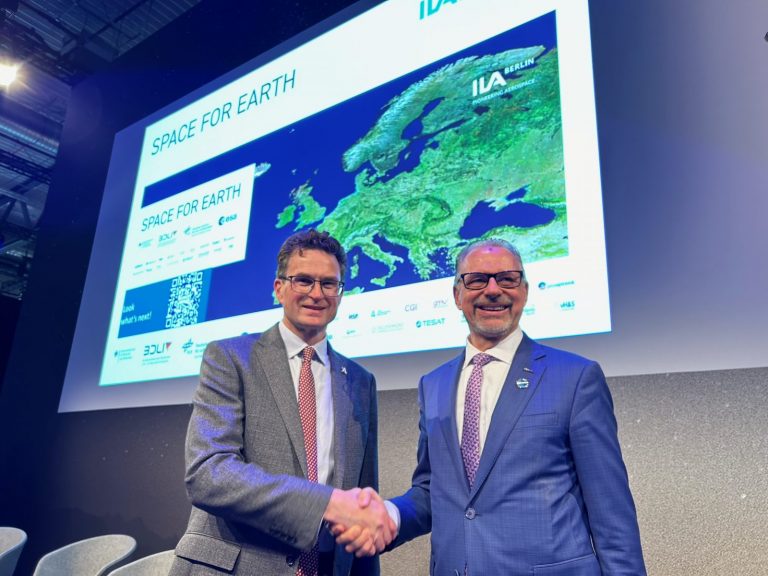Astroscale Signs Zero Debris Charter to Support Responsible Operations in Space
Facilitated by the European Space Agency (ESA), the Zero Debris Charter contributes to a safe and sustainable space environment.
Harwell, Oxford, Jun. 12, 2024 – Astroscale Ltd. (“Astroscale UK”) the UK subsidiary of Astroscale Holdings Inc. (“Astroscale”), a leader in satellite servicing and long-term orbital sustainability, has signed the Zero Debris Charter, demonstrating its support for a zero debris future in space. Managing Director of Astroscale UK, Nick Shave, signed the Charter at a ceremony in Berlin, Germany, on June 6.
“We are very pleased to sign the Zero Debris Charter, which represents a major step towards achieving a safe and sustainable space environment,” said Nick Shave. “Sustainability is at the heart of Astroscale’s vision and mission. Every innovation we develop is for the protection of the space environment to ensure that future generations can continue to utilise and explore space. Working collaboratively with other organisations in the global space ecosystem is essential for this future vision to remain possible. We hope the Charter will help in shaping the essential global consensus that is needed on space sustainability.”

The Zero Debris Charter was established by a community of proactive space sustainability advocates working together towards ambitious and measurable targets for 2030. Astroscale was one of over 40 organisations actively engaged in developing the Charter, which contains high-level guiding principles and specific, jointly defined targets to achieve zero debris by 2030.
Astroscale Statement on the Zero Debris Charter
We support the Charter’s guiding principles and collaborative approach to achieving these targets within our abilities and constraints, including minimising the unintentional generation of space debris and preventing the intentional release of debris during space activities. We commend the recognition of the importance of identifying a suitable aggregate probability threshold for space debris generation and casualty risk for constellations in low Earth orbit. Furthermore, we echo the commitment to enhancing routine and transparent information sharing and strengthening global space traffic coordination.
We also acknowledge the challenges to the progressive achievement of the targets by 2030. We subscribe to the idea that no technical requirements are imposed or created based on an interpretation of the Charter, which is intended as technology neutral. We should, however, continue to encourage the development and adoption of relevant technologies and performance indicators that contribute to the achievement of the targets, and contribute to the long-term sustainability of outer space activities, as highlighted in the Charter.
In addition, percentage-based targets for successful post-mission disposal can be integrated into reliability analyses, but consensus on methods of calculating these percentages and what the targets represent are still needed. Further, we believe that static percentage-based targets (e.g., 99%) may disincentivise operators from designing and scaling their disposal plans according to the environmental impacts of their space system. Thus, we find percentage-based targets alone to be insufficient in the practical pursuit of a sustainable future for space and will highlight this during discussions on the Zero Debris Technical Booklet that aims to act as a guide for achieving the targets in the Charter.
We are dedicated to pursuing the timely clearance of orbits after mission end-of-life, striving towards the highest probabilities of success possible, including by external means and with technologies for active disposal where necessary. Bearing in mind the measurable impact of the space activity to the environment, and the current levels of adherence by all operators, we believe that this probability of post-mission disposal success should meet at a minimum the recommendations of existing best practices and guidelines for space debris mitigation and remediation, striving towards zero debris.
In signing the milestone document, we endorse the Zero Debris Charter and are committed to achieving the right balance between technology development in space with protecting the space environment.

 Visit U.S. Site
Visit U.S. Site



